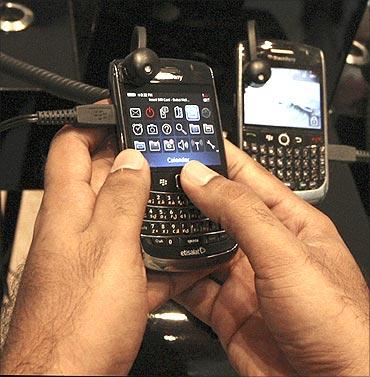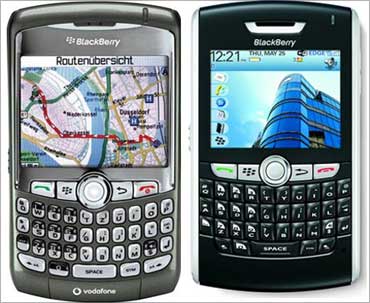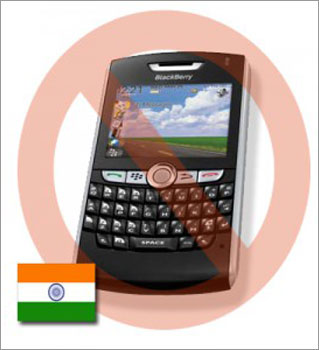 | « Back to article | Print this article |
BlackBerry gives in, to let India monitor its services
Faced with the Indian government's deadline of August 31, BlackBerry mobile phone maker Research In Motion on Monday gave in promising access to Indian security agencies to monitor all its services with immediate effect.
Nearly two months after insisting that it does not have the provision to grant access for such monitoring, RIM made certain proposals for lawful access of BlackBerry Enterprise Services (BES) and BlackBerry Messenger Services (BBM) by the law enforcement agencies.
RIM's response came after the Union home ministry made it clear that BlackBerry has to shut down its operations in the country from September 1 if it failed to provide access to monitoring of its messenger services.
"RIM has made certain proposals for lawful access by law enforcement agencies and this would be operationalised immediately. The feasibility of the solutions offered would be assessed thereafter," a home ministry statement said.
The ministry has made it clear that any communication through the telecom networks should be accessible to the law enforcement agencies and all telecom service providers including third-parties have to comply with this, it said.
The ministry will review the situation within 60 days by which time the Department of Telecommunication (DoT) is expected to submit its report.
The statement said the government has been having discussions with Canada-based RIM over the last few weeks of the issue of lawful access by the law enforcement agencies to the communication passing through RIM systems.
Click NEXT to read on . . .
BlackBerry gives in, to let India monitor its services
It was also decided that the DoT would study the feasibility of all such services being provided through a server located only in India.
RIM, which has a subscriber base of nearly one million in India, made the offer to the government to end the logjam.
Initially, BlackBerry had agreed to provide manual details to law enforcement agencies, saying it would be made available by the year-end.
On BES, the smart-phone makers had conveyed to the government that certain technical discussions were required to be undertaken before finding a solution to this issue.
Canadian smartphone maker had proposed certain ways to address India's security concerns over BES and BBM for which it is seeking access in the country.
BlackBerry had earlier offered 'metadata' and relevant information to security agencies which would enable them to lawfully intercept communication on such phones but it failed to enthuse the authorities.
RIM representatives explained that BlackBerry mobile device sends encrypted emails, which is sent to BES located with the service provider.
Click NEXT to read on . . .
BlackBerry gives in, to let India monitor its services
BES decrypts messages and sends it to the email server of the service provider where it remains stored in decrypted form. Then it is pushed to the BlackBerry device in encrypted form.
Security agencies citing concerns said they were unable to intercept and monitor BlackBerry services because of complex encrypted communication and non-availability of BlackBerry servers in India.
This is despite the fact that the government has formulated a policy regarding Internet services. As per the policy, the licencees (operators) have to ensure that bulk encryption was not deployed by Internet Service Providers.
Furthermore, individuals, groups and organisations are permitted to use encryption up to a 40-bit key length without obtaining permission from the licensor.
However, for deploying encryption equipment with a higher limit, prior permission has to be obtained and the decryption key has to be deposited with the government, the DoT said.
BlackBerry is a handset used for various kinds of services like voice, SMS and email.


